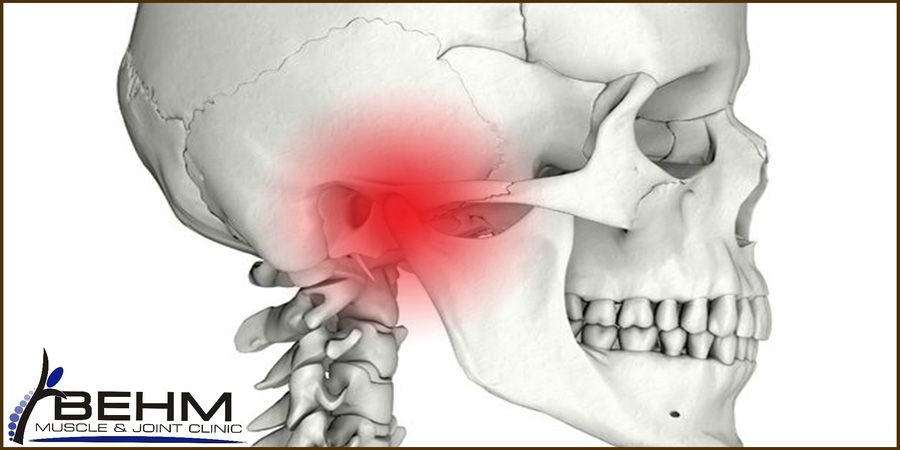
TMJ (Temporomandibular Joint) Pain
The temporomandibular joint (TMJ) acts like a sliding hinge, connecting your jawbone to your skull. The TMJ joint is responsible for opening and closing of the mouth. Proper opening mechanics involves both mandible depression and chin retrusion. Alternatively mouth closing includes mandible elevation and chin protrusion. TMJ disorders can cause pain in the joint itself, the muscles of mastication, neck pain, mid back pain, shoulder pain, headaches, or all of the above. This array of locations associated with TMJ pain makes the exact cause of a person’s TMJ disorder difficult to determine without a full functional approach. It has been shown that in most cases, the pain and discomfort associated with TMJ disorders, when not associated with a injury to the jaw, can be alleviated with nonsurgical conservative care.
What Are Causes of TMJ Pain?
The TMJ can become dysfunctional in turn creating jaw pain, neck pain, shoulder pain, headaches. Many times the patient presents with both neck pain and TMJ pain, as they are dependent on one another. Any dysfunction in one often times leads to a dysfunction in the other. Today’s repetitive, prolonged forward head posture causes increased tone and tension in the muscles of the neck, leading to imbalances in the suboccipitals and deep neck flexors. A forward head postural imbalance typically display protrusion of the chin and hyperextension of the upper neck. This imbalance leads to an overuse of the muscles, dysfunction in the mechanics in opening and closing the jaw, recruitment of surrounding musculature and pain associated with the regions mentioned above. The Sternocleidomastoid (SCM) muscles which cross the entire cervical spine become shortened with forward head posture, these shorted SCM muscles can develop trigger points which can directly be correlated to temporal headaches. Left untreated individuals will not only suffer from TMJ pain but have difficulty with chewing, and range of motion of the neck. Some people who have jaw pain also tend to clench or grind their teeth, leading to increased tone and trigger points in the muscles of mastication.
What Are Symptoms of TMJ Pain?
Common symptoms of TMJ dysfunction include:
-
Popping and clicking
-
Jaw pain
-
Reduced range of motion when opening and closing your mouth
-
Neck pain
-
Headaches
-
Shoulder pain
-
Grinding of teeth
The Behm Muscle & Joint Clinic Approach Towards TMJ Pain
At Behm Muscle & Joint Clinic we strive to assess and treat the body as a whole. Instead of focusing on the site of pain we look at the body dynamically using movement based tests to breakout areas of dysfunction which may be leading to your TMJ pain. Our TMJ assessment will include trigger point assessment to the muscles head, neck, and jaw. Assessment for joint restriction, range of motion tests, orthopedic evaluation and movement screens. Our treatment will consist of Chiropractic adjustments/manipulations to the neck and mid back, Myofascial release (Active Release Techniques, Dry Needling, stretching) and rehabilitation exercises to address muscle imbalances. We strive to provide the most up to date and evidenced based forms of care emphasizing an active care model where the patient becomes an active role in their treatment. New patients are always welcome at Behm Muscle & Joint Clinic, to schedule a consultation call us at 402-292-1450, or schedule online.
Content written by Dr. Adam Behm, DC, CCSP®
Schedule an appointment with our chiropractic team today!